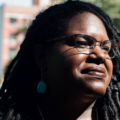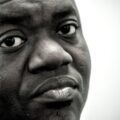“I Am Not Your Muse” and Other Lies Our Teacher Told Me

Colleen McClary’s crimson lips upturned at the corners. “I am not your muse and every good story is based around a problem.” I thought she looked like a beautiful witch. Her dirty blond curls fell long and un-bobbed, un-dyed, and she folded them back with her thin fingers, wrapping hands and hair behind the crown of her head. Her eyeliner turned down at the corners of her eyes. She wore tights so dark and bright her shins and ankles and knees were a tapestry of twinkle. Her black shoes, perched toe up on the top of her desk, watched my face with their white-eyed scuffs.
I thought she was my muse. I thought she had answers. With the right answers, I thought then, problems might birth epiphanies, an epiphany could become an inspiration, and inspiration is what allowed a writer to lift a field of flat words up into three-dimensionality.
In the private tutorial, we were talking about my writing. Your writing. I liked to hear it spoken of this way. My gift. I began to take myself and “my writing” very seriously. My grandmother had recently died. I had been working on a collection of stories based on my family because I thought if I wrote about her, about us, she would live just enough for me to make peace with her passing.
McClary lifted her arm into the air and let it fall into her lap like a snake.
“The problem gives the story movement; something to be resolved,” she had told our small class of seven. McClary spooned stories to our class; she explained significance. We ate the words at home and then regurgitated them the next morning. “That’s it!” she would say. “There’s the theme!” she would cackle. Sometimes she would begin, “You do not understand at all!” or “No! I am in a terrible mood today. Please. Bear with me, but even so! You have it all wrong.” But the next day, “Yes! Yes!” The bad days made the good days better.
And she understood us, so to not only be understood, but to understand, was something, was to exist in a room full of somebodies—her class. We read the stories she gave us out loud in class after reading them at home, feverishly.
“I am Heathcliff!” someone yelled into the classroom.
“I do not know how you are going to write this,” she said. Her black heels nicked her desk. My heart grew and fell. The spring of her black chair squealed. Four small wheels circled the linoleum, stopped. “I do not know how you are going to write about your brother.”
My brother, Jon Henry. I rolled my eyes, looked inside my mind and found—nothing. “There are no problems,” I said.
Her crimson mouth twitched. “Are you sure?”
I watched her for a minute, small in my chair. The skin on my tailbone stretched, aching. I tried again. But Jon was so good. He played varsity sports. He graduated high school with a 3.98 GPA. He graduated college with no debt, earned a scholarship for medical school, joined the navy. He planned to become an emergency surgeon. He was the first son, not a stress to my father, my mother, even after their divorce, and my mother’s second divorce. I once overheard that he was the easiest child of my mother’s four.
I remembered my brother brushing my long, blond hair when I was small. He named each knot as it fell to the bathroom floor. I remembered him, not much older than me, holding my hand as we walked to the bathing suit store because he somehow knew that I would not want to go to Cincinnati’s Beach Water Park wearing shorts like he and our dad. The suit was neon pink and looked just like a bikini that older girls might wear, which was wonderful.
My brother had no problem with my parents’ divorce, or, so it seemed, their battle of religion; would we be raised Jewish or agnostic—spiritual? Once, when I was five, my father took us to a Mikvah, the large pool of water that would cleanse us, renew us, ready us for the Jewish faith, without telling my mother. Jon held my hand and said it would be just like going swimming. A large lady in gray took me into a small room and told me to remove my emerald birth-stone earrings. I plunged into the water. Bubbles floated up while I went down. I swam to the other side.
There was so much to write about my parents, problems, pulling their children like wax between them. I grew up the daughter with an absent father, but I was also spoiled by an overcompensating older brother.
“The problems are not my brother.”
This notion was ludicrous to McClary. “There is always a problem.”
I still feverishly, magically, believed writing about each family member would somehow revive my grandmother. The chapbook I would make, a compilation of stories and poems about my family would, McClary said, become my final step in grieving. My brother’s lack of problems was a problem.
“Well…” I said.
McClary sat up, leaned in.
Our class formed parties with tea and cake, re-enactments from Alice in Wonderland. We memorized lines and lines from books and plays. We would ace the AP’s the following year. Learning lifted meaning from flat places. Her sense of fun only legitimized a sense of duty. She would read to us from the poetry of Suzanne Somers, and pretended to be the old thigh master in a sugar-starched voice. We laughed hysterically. We could not get enough of Somers née McClary: “Last night, it was right. I was lonely, uncertain, and George was out of town.”
Twice she took us sledding outside our high school building. We slid down the cross-country hill beneath the blue backdrop of Acadia National Park, zooming coolly on black trash bags. Flakes spat on our cheeks and eyes, wrists, and elbows, the creases in our pants, leaking into our boots and licking our feet.
We worked harder for the bit of cool air she gave us. We read more, memorized more. We were honors students, and our consumption grew competitive, manic. Some of us won contests, traveled to art workshops, maintained good grades, and we felt honorable in McClary’s kingdom. “Queen,” “Muse,” “Fabulous”—we turned her vernacular back upon her. We applied McClary’s own words to McClary, because those were the words we had learned, and she was the source of our knowledge—an incest and worship of knowledge, proliferating.
McClary was sitting up, leaned in, listening now to the one maybe-probably of my brother, Jon Henry. “When we were very small, our grandmother taught us to believe in fairies.”
“A disenchantment story?”
“We used to believe in them so much, and he was the first to stop.”
“A rite of passage story?”
My aunts and mother and grandmother had worked to make him believe again, to slow down the propeller that would fling him into adulthood. They had taken him on a nighttime fairy hunt through a graveyard. Magic or its lack of existence was beside the point. This was about the loss of belief, or belief maintained in the unbelievable. The intense conflict was in the inner workings of those women who needed to stop time, preserve innocence, and ultimately could not.
If he did not stop believing in fairies, he did stop believing in the power that the Mothers of our family instilled in the fairies—childish joy—so what is the difference?
“This works,” she said
I scripted a fantastical story— a graveyard at night, the moon with a face, my brother frightened to tears, our grandmother and mother and aunts like Macbeth’s crones. A story where my brother sat on at a gravesite in the dark, thinking of the fairies of yesteryear, of childhood and the loss thereof, until he finally found a note beneath his pants. The note read: “You know what to do,” and it was signed by a fairy, written in cursive for good measure. In the story, the moon would give him a clue, a wink like a giant fairy star to aid in his decision as to what to believe in. In the end, none of the enchantment was more enchanting than simply terrifying. Like seeing ghosts.
In my story, he stopped believing, because he did not want to seem weakened by fear. It made him seem stronger to be less afraid and so he avoided fear altogether. This, I thought, was adulthood.
The fantastic—the fairies—crashing through the mental glass of logic, do not seem pretty or wonderful.
I did not think it mattered if the real conflict did not have to do with my brother, that the story was a collection of lies; I supposed then that what mattered most was that his existence in any story of the collection of all those stories of my family would make our stories complete, and so come alive.
You need veins and arteries to make the heart work. He was the last bloodline.
And then my Grammy could live again. It was she who had created the fairies in the first place, and without her their beauty was gone. She never taught any of us how to make joy on our own, only gave it willingly.
I missed her.
I did not tell McClary that it was I, not my brother, who was caught in the middle—the place between childhood and adulthood, enchantment and disenchantment, joy and terror.
I wrote so much about my grandmother for the Family Chapbook, for the Independent Study with Colleen McClary. There were problems enough to energize a universe, or one large problem that broke into many, scattering pain like confetti all over my mind: my grandmother was gone.
I wrote these moments into stories, to bring them back alive:
A walk in the woods.
Leaves full of children. Children filled with leaves.
Fairies in the moonlight, like far-off stars.
Playing dolls in the corner, between the wall and the fireplace with Grammy.
The dog’s toenails against the slate-stone floor.
The smell of bacon.
Twirling in the yard while Grammy played football with the boys. Me saying, “I love my life.”
And Grammy saying to my mother, later: “Does she really? Are you sure?” Worried about the divorces.
And more fairies—Mother Earth’s confetti.
And more fairies.
And all those moments we were happy. And Grammy was there to preserve it—as though into capsules of light in a dark, dark night.
I glued the stories into a leather-bound book. I pasted handmade paper and photographs onto the black pages. I circled the pages in gold and silver, made stars, painted swirls. I drew our family tree ad our names hung like apples from the branches.
I glued in my poems of dreams. My grandmother had come to me in sleep, often, since her death. In one dream, she had said, “Are you okay?” She had sat beside me on the branch of a tree. My legs scraped the bark.
I did not know if this was fairy play, or just a Freudian wish fulfillment. In any case, it worried me, because it would not last. It had been hard for Grammy to re-form her soul into a body; it took too much energy, she said in the dream.
The chapbook, McClary and I both thought, would help. McClary believed it would end the anxious dreams—the bitter grieving. I believed it would expand them, make them real—and so happy.
In the end, I unfolded its pages in front of McClary, who eyed me coyly during the last of our one on one student/teacher conferences. I looked inside. The pages were flat, thick. Nothing rose above them. I tried to read out loud but the words stuck in my throat. I couldn’t stop crying.
Ours was a class that disliked school, for the most part, bored mainly. McClary pressed us to believe that we were not too good for learning, while winking at us that we were too good for most other things, or people.
In the middle of one semester, we made her a giant picture after reading Oscar Wilde, twelve-feet-tall and ten-feet-wide. It was formed from tiny clippings of magazines, of popular culture, glued together to make a face, a face so shaded by popular culture that you could not see his eyes or nose or mouth unless you stepped twelve-feet-back.
McClary hung it with pride on the classroom, so that the face of the shadowy man watched all. But the classroom was only twelve-feet-long and twelve-feet-wide, so in the end, he could see more of us than we of him.
See McClary! Popular culture is obscuring his face; he is made up of all he has soaked up—from his surroundings. Society. He is shaded.
This was the picture of Dorian Gray. We all loved the book.
Isn’t he handsome?
He was fabulous.
“Nothing is as good as the real thing,” I told McClary. I meant words.
“Literature,” said McClary, her animal eyes softening, brown to hazel, “is liberating. You cannot forsake literature because of your experiences.”
“I do not even care if I am good!” I pounded the desk, sobbed into the plastic laminate top. The tears fell around my face, spread along the table., dripped off the edges.
I pressed my cheeks to its hardness. “Being good at literature is not what matters!” I sobbed a baby tantrum. “I want real life!”
“I never said you were any good!” she snapped. McClary softened, moved toward my desk. The wheels of her chair cut the floor, screeched. She touched my hair and her hand felt like a mother. I relaxed.
“I know how hard it is,” she said, her voice low, soft. “I know how hard it is to write about your family.” She leaned back and sighed, rolled her eyes up and stared at the ceiling. “My family, oh Jesus.” Her Boston accent tinted Irish.
She often told her own stories, when she did not tell the stories of the Greats, those with the greatest of problems, from a canon of literature of problems.
I liked how she flailed her arms in the air when she performed a tale, her face growing red, her body brimming with old times.
We always sat at our desks, watching, laughing. “One time, my brother and I pretended to put a dead body in the road. A fake dead body. We watched to see how many cars would pass without stopping. None of them stopped.” The redder she grew, the more her Boston accent turned Irish. On occasion her stories would tip into too personal. She was usually good at retreating, fast.
Once, she mentioned how her favorite brother had died. Her eyes got wet, then she laughed, moved ahead, on.
Many times, she told the story of replacing her sister’s shampoo with Nair. Her sister who “beat the shit out of me.” Sandy. Sandy’s long blue-black hair never grew back the same. It does not pass the chin anymore, still today—a portion of it coming down forever in a long gray sliver of tin, crimped as though staticked, as though once caught on fire.
I think a favorite story of the class was the one where she impersonated the head witch during a parade and celebration in Salem, Massachusetts. News cameras there caught her.
Her sister—“who was a little crazy”—had wanted to steal a limo. “The limo just pulled up beside us. We were young and I agreed with her. Why not?” She snorted a laugh. “Turned out the limo was for the head witch. We went along with it.”
Now she is banned from any Salem witch celebration, apparently.
Then she said, “That was not long before my sister was sent to the insane asylum.” Then her laughter cut short, a stopper in the throat.
Once, she went too far with one of her stories. It was the story of Flopsy.
She said, “Once I had a boyfriend. Well, we were married.”
We were sitting in a circle of desks, watching the leader in the ring.
“He used to beat me.” Her words slid, cool, detached. “He used to hurt me.” Our eyes searched her, for the punch line, if not the moral.
“He beat me.”
I think the topic was things that we are ashamed of—I do not know if this was anything to do with the day’s reading or if she was trying to relate to us, sympa- or empathize with us, as she often did, and tripped too far forward from theory into terrible reality.
“Well, I had this cat. The cat was named Flopsy. Flopsy was the greatest cat. I did not know how to get away from the boyfriend.”
Each sentence jammed against he next.
“I loved this cat. The boyfriend beat me. Once when he was not home I took Flopsy in my arms. I held him tight. I was very upset. I did not know what to do. Then I filled up the bathtub. The bathtub was full of water. Then I pushed Flopsy in. Then I held him there. And I held him there, until he drowned.”
We watched her; we did not watch her, eyes unfocused, gazes landing randomly, onto the chalkboard, onto the wall, onto the picture of Dorian Gray, all shadows and lines.
I suppose, looking back, that the animal must have soaked up her pain, as animals often do.
At the end of the semester, we bought her a plastic purple sled. On the sled we wrote, “I am Heathcliff!” We also used a navy blue sharpie to write, “Frankenheimer,” which is what we had renamed the monster, who we kept confusing with his creator. We also wrote, “We love McClary.” And: “And George was out of town. I wanted you. I needed you. Or thought I did” from Suzanne Somers’s poetry.
We laughed hysterically when we gave the gift—the laughter of those excited by their own humor, of a heated trembling built more on anticipation for a moment than the moment itself.
McClary laughed when she took the sled. She hugged it close and the pale plastic scraped against her twinkling skirt.
About Marni Berger
Marni Berger holds an MFA in writing from Columbia University and a BA in Human Ecology from College of the Atlantic. Marni’s most recent short story appeared at Matador Review. Her fiction has been a finalist or received honorable mention in seven Glimmer Train contests and one New Millennium Writings contest, while her short story “Waterside” appeared in Issue 96 of Glimmer Train. Her work has also appeared at The Common, The Days of Yore, The Millions, and Fringe Magazine. Marni has new essays forthcoming in Lotus Eater, COG, and Cold Creek Review. Marni lives in Portland, Maine. She has taught writing at Manhattanville College and Columbia University.





